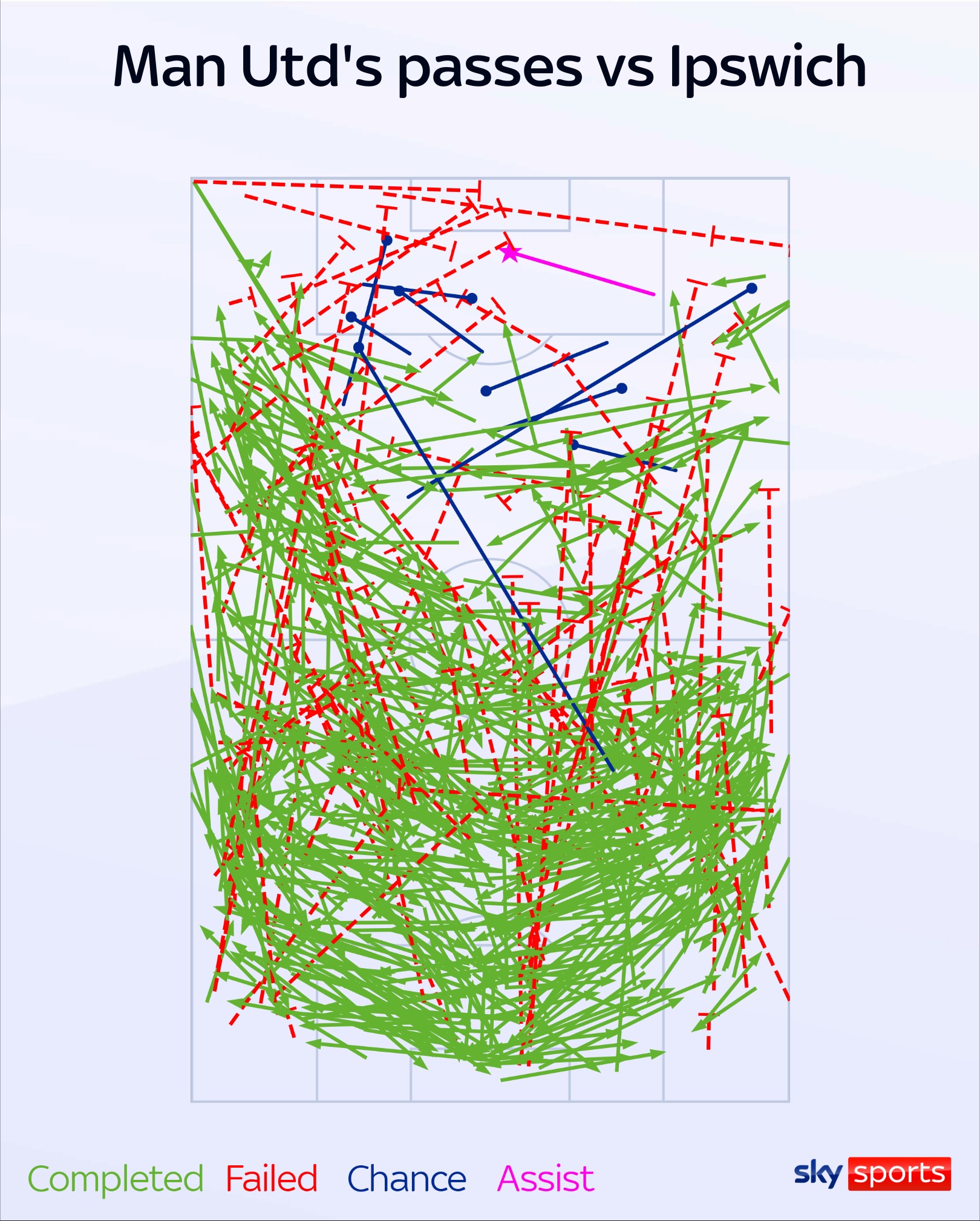Man Utd: Ruben Amorim has pile of problems to address from work-rate and creativity to selection options
25 November 2024, 11:20 | Updated: 25 November 2024, 13:00

The sight of Amad skipping down the right wing to lay on the opening goal for Marcus Rashford after just 81 seconds seemed fitting given the feel-good factor generated by Ruben Amorim's arrival. What followed showed why change is still badly needed.
Manchester United came away from Ipswich Town with a 1-1 draw and could hardly claim the result was harsh. They failed to create a chance as good in the subsequent 92 minutes, while relying on Andre Onana to keep the hosts down to just one goal.
Liam Delap went close twice, both times spectacularly denied by the Cameroonian goalkeeper. There are only three previous examples this decade of a player having such a high expected-goals total against Manchester United and failing to find the net.
Onana earns point for Amorim
Given that United are in the bottom half of the Premier League table, one might expect Onana to have had a disappointing season but the opposite is true. Amorim would be inheriting an even worse situation had the goalkeeper not regularly saved his side.
In fact, the statistics show that Onana has saved between and four and five goals more than might have been expected this season given the location of those shots and where on the target they were struck. No Premier League goalkeeper can match that.
Amorim was more animated when Onana somehow stopped Delap's first big chance with the goal gaping than he was when United scored. But he will not want to be so reliant on his goalkeeper in the future. His remarkable reactions saved United on Sunday.
Adam Bate
Man Utd running into a familiar problem
Early in Erik ten Hag's reign he called Man Utd's players into training on a scheduled day off and ran 14km with them. It was an exercise to underline the extra amount of ground Brentford had covered in that chastening 4-0 defeat and highlight to the United players that work rate and intensity had to be added to their on-ball ability.
It was a ploy that paid off in the short-term, with United beating Liverpool 2-1 next time out.
Amorim may not go for the same approach this week - he has already cited the need to rotate his players in the coming games - but nonetheless the running stats of this United squad continue to underwhelm. In fact, they're alarming.
Against Ipswich, they covered 6.5km fewer than their opponents and made 138 sprints to their hosts' 150. This season only Fulham and Chelsea have been out-run by United in terms of distance covered. United have lost on that metric and the sprint count in every other instance in the Premier League this season.
"We have to be so much better physically to cope with the high pressure, the volume of the high-speed running, all these things but we need time to work on these things," said Amorim. It's a message that has to hit home for United if they are to hit the levels the Portuguese is chasing.
Peter Smith
Struggling to progress the ball
United attempted 649 passes against Ipswich, more than in any other Premier League game this season. But the vast majority - 449 - of them were in their own half. They actually made more passes in the opposition half in seven of the previous 11 games.
In fact, United attempted 69.2 per cent of their passes inside their own half at Portman Road, which is their highest percentage in any Premier League game since Opta began recording such information over 20 years ago now. It is an astonishing statistic.
It reveals two things. The first is that there was a clear effort to build the play from the back far more than previously. The second is that they were largely unable to do so, the moves often breaking down inside their own half, unable to progress the ball upfield.
Adam Bate

Creativity and cutting edge lacking
"The same players and the same problems," said Sky Sports pundit Roy Keane. Chief among those problems, he added, was a "lack of goals and a lack of quality" in the attacking third.
Manchester United's performance at Portman Road was just the latest in which they have exhibited meagre levels of creativity and goal threat. Their total of 13 goals from 12 games puts them 14th this season, level with Ipswich and below Leicester.
It started promisingly against Ipswich, of course, but Manchester United finished the game having generated only 0.80 expected goals. Damningly, it was not even their lowest total of the season.
On the occasions when they have created chances, they have often been let down by poor finishing. Manchester United's 13 goals having come from 165 shots. It is an average shot total, the ninth-highest in the division, and equates to a 7.9 per cent conversion rate.
Only three sides, Crystal Palace, Everton and Southampton, have converted shots at a lower rate this season. Struggling to create and unable to finish, Manchester United's plight leaves Amorim with his work cut out to solve the issues.
Nick Wright
Players playing out of position
The overarching reason why Amorim will need time to address these issues is because this squad is not obviously suited to his system. Amad made an encouraging start in his wing-back role on the right but was tested defensively. It is not his natural position.
Many others would be able to argue the same. Diogo Dalot played at left wing-back. Noussair Mazraoui tucked inside to form part of a back three. Rashford started up front, a role he has been reluctant to assume. Bruno Fernandes played as an inside right.
This is not a squad that has been built with his 3-4-2-1 formation in mind. Given the scale of the spending in the summer that raises questions regarding the forward planning at the club. Amorim would no doubt love some of that money to spend in January.
Instead, it will surely take longer to correct course. The challenge is to build a team that can play with the intensity that he demands and within the system that has brought him success. United's struggles against Ipswich were a reminder of the size of the task.
Adam Bate
(c) Sky Sports 2024: Man Utd: Ruben Amorim has pile of problems to address from work-rate and creativity to selection options






